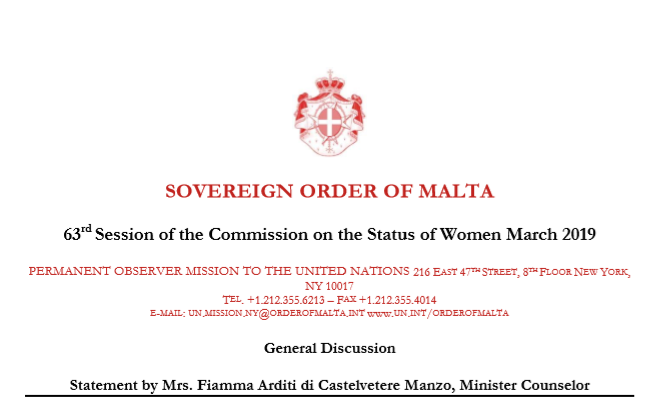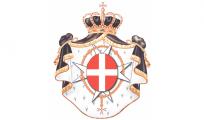
Dear Mr. Chairman/Madam Chair,
I would like to express my sincere appreciation for giving me the floor and allowing the Sovereign Order of Malta to contribute to this discussion.
The Order of Malta has been committed to the care of persons around the globe irrespective of sex, religion, ethnicity or nationality for over 900 years. Today it operates over two thousand projects in 120 countries caring for and upholding the human dignity of those in need through medical, social and humanitarian works. The humanitarian assistance provided by the Order is focused on the most marginalized and vulnerable persons around the globe. However, aligning with the priority theme for this session of the Commission, I not only want to stress the situation of women in regions affected by crises but also point out problems that women may be facing globally. We feel that identifying and implementing policies to assist, protect and include women and mitigate inequality in our societies is indeed one of the highest priorities.
Firstly, in accordance with the theme of this session I want to outline our concerns on the situation of women in regard of social protection and access to public services in many parts of the world. Although, gender-related inequality is often associated with economic inequality it is by far not limited to this aspect. The lack of social protection and associated with that limited access to healthcare remains a severe problem globally. The Order of Malta is very active, including its humanitarian aid arm Malteser International, which provides assistance and basic services in disaster
situations, regardless of their gender, ethnicity and nationality. The Order of Malta successfully runs a hospital in Bethlehem, Palestine, which provides state-of-the-art pediatric, obstetric, and gynecological care to women and children. Since 1990, Holy Family Hospital has delivered over 75,000 babies. Our flagship Hospital treats all those who seek care, regardless of their ability to pay and thereby truly echoes this year’s theme of providing women access to services.
Secondly, let me stress the situation of crisis regions, where women are disproportionally among the victims. Besides the lack of basic services, women are particularly susceptible to problems associated with forced labor. In this regard, we especially want to outline the issue of human trafficking and sexual exploitation, a topic that was frequently discussed at the United Nations in the past and still remains an acute issue. Besides the apparent and urgent need of access to medical care for affected women, we should address the issue of their long-term reintegration into society. This not only includes supporting displaced women relocating to their hometowns but moreover offering services in the countries of the origins of the women. In this respect, the Order of Malta runs an exemplary project in Lagos, Nigeria. The “Bakhita Villa Project” aims to save human trafficked victims from international sex traffic. It serves as a point of re-entry for rehabilitating the trafficked girls and women and reintegrating them into society. It provides protection, family reconciliation, healthcare, spiritual support, counseling and vocational trainings. In order to achieve further development in this field we welcome all support from the international community. This project shows the complexity of the work in this field and the importance of providing public services and social protection to women.
The UN has made a major impact on these issues and we encourage even more support in the future. In order to achieve a sustainable change in regard to the empowerment of woman and an improvement of their living conditions, we strongly support the inclusion of women in decision making processes at all possible levels. This ensures that women, their rights and their opinions are well regarded and implemented. This functions as a major enabler in development, peacekeeping and resolving many types of crisis.
Thank you, Mr. Chairman/Madam Chair


